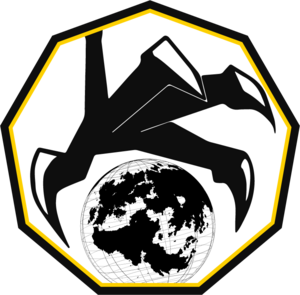PRCO
This article is incomplete because it is pending further input from participants, or it is a work-in-progress by one author. Please comment on this article's talk page to share your input, comments and questions. Note: To contribute to this article, you may need to seek help from the author(s) of this page. |
| Primární Ředitelství pro Civilní Ochranu | |
 Official PRCO Seal | |
| Agency overview | |
|---|---|
| Formed | November 14, 1941 |
| Dissolved | 31 December 2020 |
| Type | domestic and foreign intelligence agency |
| Jurisdiction | Ostrozava |
| Headquarters | Kymorín Building, 224 Torsfeld Avenue, Karsko |
| Motto | Vždy Verný Always Faithful |
| Parent Regulatory Body | Prime Defense Council |
The PRCO (Ostro-Ludzic: Primární Ředitelství pro Civilní Ochranu, tr. Prime Directorate for Civil Protection) was the primary security agency of the Prime Republic of Ostrozava from 1941 to 2020. As a direct successor of the preceding Council for Informational Warfare (RIV), the PRCO was ostensibly suburvient to the Prime Defense Council, itself mediated by members from every branch of government, including the Primar. A monolithic intelligence apparatus, its main responsibilities were domestic intelligence, foreign intelligence, counter-intelligence, operative-investigatory activities, and organization and security of government communications. Although formerly able to exert its power as a secret police force, the Bartoș-Nabornek Act of 1969 formally ended its ability to bypass legal rights enshrined in the Ostrozavan Social Contract, while also placing the agency under the jurisdiction of the newly-created Prime Defense Council. In 2020, the Volf disclosures revealed that the PRCO had been involved in various nefarious and clandestine actions in the 20th century, most recently the creation and funding of the International Democratic Revolution. Interim Director Valdemar Rezek was murdered in September of 2020, launching an investigation that resulted in the indictment of six out of nine supreme court justices. The PRCO was subsequently dissolved on the 31st of December 2020 at the behest of the Král administration.
Domestically, the PRCO's reign as a brutal secret police force is generally associated with the Socialist-party-led Second Party Compact; the PRCO's brazen use of intimidation tactics on law-abiding citizens has long colored the agency both domestically and internatonally with a reputation of underhandedness and immorality. The agency is often considered to be a paramilitary service in the vein of the Ostrozavan Civil Guard. While most of its historical and current activities have remained enigmatic to the public eye, sporadic leaks of data, and two Prime-Government-mandated releases of information have kept the agency semi-transparent in the eyes of the media.
Although known to have been active in limited capacity post-Neutrality in the 2005 Polnitsan War, the PRCO has most recently been embroiled in the , as part of the broader political crisis caused by the